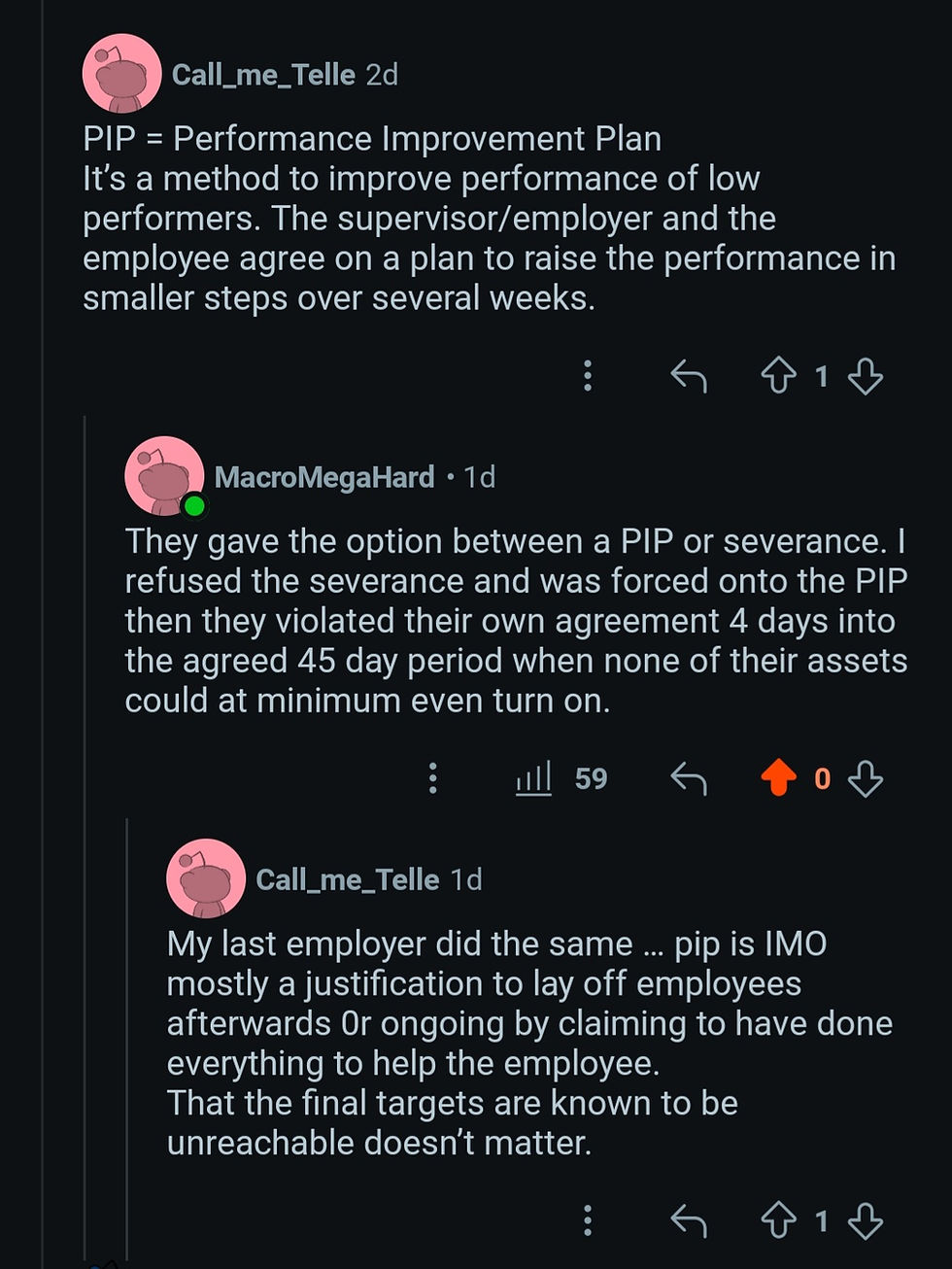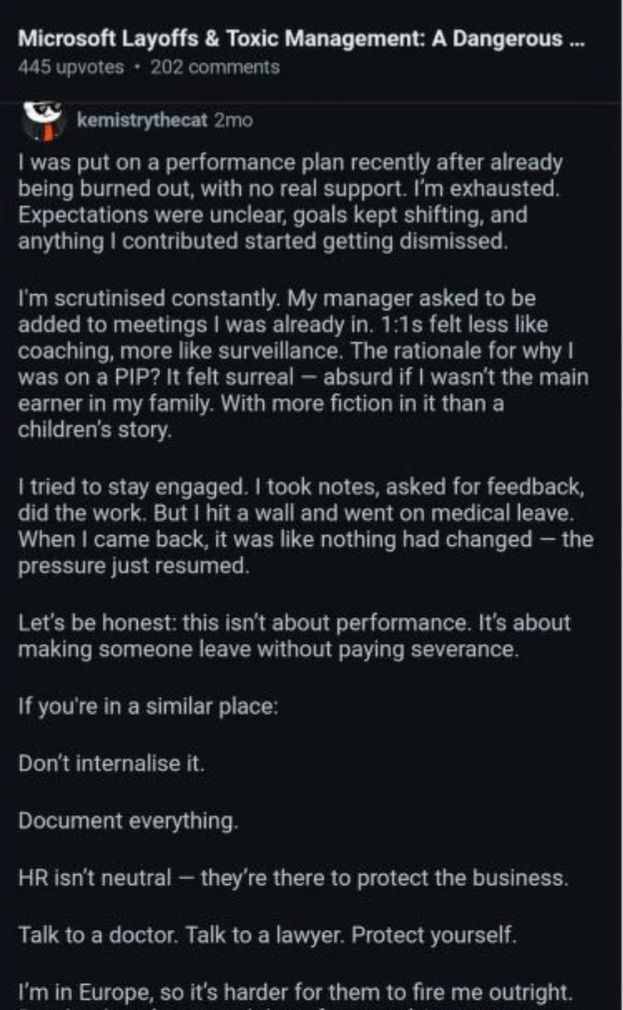Update on my Case Against Microsoft
- Trevor Alexander Nestor
- Sep 12, 2025
- 9 min read
Updated: Nov 19, 2025




In previous blog posts I described a recent state investigation (from the state of Washington, though the representative told me that it would be forwarded to the proper federal channels as well) I triggered into Microsoft (yes, not just a complaint - the actual investigation that has started) for wrongful terminations, ADA noncompliance, and whistleblower retaliation, and while I received overwhelmingly positive reception on both Reddit and LinkedIn for the story, racking up hundreds of thousands of views across platforms, I started to find things were somewhat different in some select subreddits.
https://www.trevornestor.com/post/my-affiliation-with-doge-llc-and-other-questions-about-credibility
In my original article I explained the issues | witnessed at Microsoft and the sorts of emails and messages I've received on a daily basis since going public about the story mentioning things like physical stalking, whistleblower retaliation, ADA non-compliance, pathological lying and dysfunction, replacement of engineers with H1B visa holders and non functional Al tools like copilot to undercut wages and working conditions to the point that employees cannot do their jobs, the inability of Microsoft to provide their engineers the bare minimum of laptop assets that can turn on in a timely manner, the unaffordability of purchasing one's own home near the campus or metro where one is more often expected to work, the gutting of their IT support on campus, missing critical documentation, deliberate information siloing, passive aggressive behaviors, wrongful terminations, whistleblower retaliation, and so on. All details about and context for this original complaint that I will be discussing - along with the relevance of AI and the H1B visa program can be found in the link below in greater detail.
Original Article Blog Post Containing Complaint Overview:
After posting in some subreddits, responses on my thread contained a litany of logically fallacious character assassination attempts, Kafka traps, and ad hominems, and claimed that going public might damage my case or the optics, or Microsoft might retaliate (even illegally) if I do (possibly due to astroturfing - the act of manipulating social media for positive PR, which Microsoft is said to participate in): https://www.pcworld.com/article/439883/microsoft-caught-astroturfing-bloggers-again-to-promote-internet-explorer.html
In one substack article, I've been accused of vaccine skepticism, responding to and having direct affiliations to Elon Musk, harassing the CU Boulder police department, belief that space lasers caused the Colorado wildfires, distracting from domestic violence victims, and direct affiliations to DOGE.
The irony is that what I've done is advocate for Medicare for all, criticize Elon Musk for his desire to increase birth rates while failing to look at the socioeconomic conditions creating anxiety about having children, reporting declining mental health of students to the CU Boulder police department immediately before a mass shooting in the city and a violent riot of students flipping police cars, make a sarcastic comment about the wildfires, advocate for worker protections against physical intimidations reported outside of work hours, and file a complaint against wrongful terminations.
I initially deleted the original story (which I was cautious not to include any information that could possibly violate any NDAs) from my blog and LinkedIn - but after some review of this, in spite of general advice to avoid public attention for legal matters, I've decided to double down on going public, because in doing so, others both at the company and who have been recently wrongfully terminated have messaged me thanking me for doing what they have been afraid to do themselves (some have even reported physical intimidations) - which only bolsters my position. This includes even those in director level positions still employed at the company, as well as journalists. In this way, going public was actually a necessity.


The way these corporations continue to get away with violations of labor law like wrongful terminations is precisely by means of isolating individuals, controlling narratives and public perceptions, and gaslighting campaigns under a thin guise of care and plausible deniability - one might even argue that this is a part of the purpose for AI itself. The way I see it, even if gatekeepers through formal channels fail to hold Microsoft accountable, by going public and resisting fear and intimidation, I've already won. More critically, discussing these matters is not illegal - the information here is already public knowledge and taken from chats outside of work which do not contain trade secrets or internal chats/emails/code.


I will be deleting some of the more speculative or inflammatory comments on the matter and redact the original article, but it is important to note that the current trend at Microsoft cannot continue - regardless of the tone or the optics of my complaints - the bottom line is that Microsoft has violated labor law, and regardless if judges, attorneys, or investigators are paid off or have conflicts of interest - when your employees no longer have anything to lose, they only have things to gain by going public about it. In fact, even the CEO recently apologized about these matters.




Beyond violations of worker protections, the internal problems at Microsoft forces us to think critically and re-evaluate what the ultimate goals are and purpose is behind these investments in AI, quantum computing, and cryptography, and if more could be achieved by investing directly in local communities and teams where value in trophic social networks scales exponentially - not only from the perspective of ethics, but from the perspective of pure computational capability and product quality - and as an information survelliance, control, and synthesis tool, AIs will then thus reflect.
At Microsoft, I found myself heavily discouraged from discussing anything with teammates. In fact, during my onboarding - I was criticized harshly for asking the perfectly reasonable question about why results do not appear for a correct query in their database - where the reason was that they are kept there for a certain time window. I heard this used against me months after I asked, in spite of the fact that those in roles above me would frequently consult me to assist them with what was so poorly documented in our team, they could not even figure out.
Onboarding was so turbulent that after extended delays, the entire org was eventually forced to do a hackathon to fix critical documents, and while my manager would throughout my employment attempt to isolate me by claiming that when I encountered blockers which required outside interventions, nobody else was facing them. I would often find that after asking coworkers - virtually everybody would be facing similar blockers - all saving face - creating massive inefficiencies within the org.
One example was that with the rollout of new secure signing processes for code, the manager claimed "nobody else" was having issues with it - then when calling 2 coworkers to run the process with me - neither could get it to work, in spite of hours of time on the matter. When they were eventually forced to do a knowledge sharing session after weeks of delays, it was then revealed once again that the documentation was wrong and missing critical information, and virtually nobody could do it.

In spite of being encouraged on the company portal to reach out to coworkers across teams to foster innovation at the company (with an internal tool called "whois") I was chastised for reaching out to the research and development department regarding my insights into their Majorana One quantum computing chip (which critics say they lied to their investors about, evading public questioning and scrutiny when it wasn't actually functional and not based on any established physics, which seems to be a pattern).
I had interest in the topic as my undergraduate professor at UC Berkeley was fields medalist in mathematics Dr. Richard Borcherds who specializes in lattice maths and the physics implicated in Majorana fermion spin lattices. Now, I have been published on the topic and cited by leading scientists, and have a second paper out invited for a second round of peer review at Elsevier on the topic. In my PIP, I was both told to depend on others more, but paradoxically depend on others less.
How can creativity and innovation thrive without a sense a psychological safety and support on teams for curiousity and discussion or collaboration, where everybody is too annoyed and preoccupied?
In spite of the insistence that as a senior engineer, I should have just been "self learning" and "self unblocking" as my manager put it (who would frequently just not show up to his weekly syncs) it is not possible to grasp proprietary internal systems without proper permissions or tribal knowledge, and relying on AI tools trained on missing, outdated, wrong, or misleading documentation about evolving security processes produce garbled garbage when asked about it. This is also why these AI tools will never replace teachers, no matter how badly tech leaders would like them to. In fact, in many cases, to "self unblock" when I was asked would have been a violation of Microsoft security policy.

There is no further plausible deniability when my doctor specifically requested that | receive adequate support, documentation, and training on the team - and they could not even provide the bare minimum of any basic functional Microsoft assets for the entire duration of my PIP that could even at minimum turn on - in fact, my manager failed to answer emails for the entire duration of the PIP period. I was told that I had the option between a severance and a 45 day PIP period, and my 45 day PIP period was abruptly cut short to only 4 days (shortly after submitting a "report-it-now" case for possible security holes) where | was blamed for "not meeting expectations" when they didn't even play the period out to demonstrate that.
I have retained hours of video and audio footage unambiguoisly showing the failure of Microsoft's IT department that they offshored to 3rd party contracting companies in other countries that often interface with laptops that contain sensitive government data (where they then get hacked by those other countries while stupidly instead of fixing that continue to layer on additional security hoops for their own engineers to jump through). While Washington requires 2 party consent for audio recordings, at the beginning of each call to the IT support there was a message stating that the calls "may be recorded for quality and training purposes." I will be handing this evidence over to state investigators along with the physical assets themselves, and documentation regarding the continual and constant refusal for accommodations when requested and basic support required to do tasking (which often lacked descriptions, and for which feedback was often intentionally vague).


As others have pointed out, Washington is an "at will" state, meaning Microsoft reserves the right to lay workers off (within limits like those imposed by the WARN legislation), but wrongful terminations, ADA noncompliance, whisleblower retaliation, dishonest practices like I've described, and physical intimidations outside of work are not. There is no excuse for one of the largest corporations by market cap in history to fail to provide their engineers the bare minimum working conditions they need to succeed - and then to gaslight and lie about them.

I will provide further updates as they come, but for now, first, we will see what the response is and the actions that are taken by the state. Things will not change unless we begin to demand change and accountability.



Comments